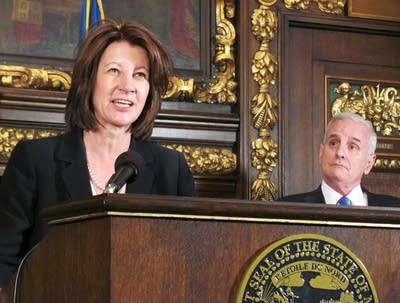State review finds HMO finances are 'generally sound' but report raises questions
Go Deeper.
Create an account or log in to save stories.
Like this?
Thanks for liking this story! We have added it to a list of your favorite stories.

A state review finds Minnesota HMOs providing services to public programs such as Medicaid and MinnesotaCare have generally sound financial practices. But the report did raise concerns about the plans' charitable donations and other uses of public dollars.
Last March, Gov. Mark Dayton called for a review of how the non-profit health plans were spending the taxpayer money they receive. The government health programs are designed to provide health care coverage for many of the state's poor, vulnerable residents and children.
Dayton directed the auditors to look at whether the plans' administrative expenses were appropriate. That's important in part because the Dayton administration had made a deal with the plans to return to the state any profits above a 1 percent cap.
The study looked at four plans: Blue Plus, which is part of Blue Cross Blue Shield of Minnesota; HealthPartners; Medica; and UCare for fiscal year 2011.
Turn Up Your Support
MPR News helps you turn down the noise and build shared understanding. Turn up your support for this public resource and keep trusted journalism accessible to all.
The results of the study show need for closer review, Human Services Commissioner Lucinda Jesson said.
"While overall these show that the managed care organizations are generally using sound financial practices, there are a number of things going forward, we might want to make sure are changed," Jesson said. The audits raised questions about the HMOs using public dollars for lobbying, marketing and advertising; making charitable contributions to organizations in which the HMO had an affiliation.
The report indicated Blue Plus made a $10 million donation to the Blue Cross Foundation. The company said the money was being used to help improve the health for people eligible for public programs including low income children and families in Minnesota.
The report also singled out Blue Plus for using tens of thousands of dollars for lobbying. The insurer said in a statement that it "believes its financial reporting practices and methodologies are appropriate, reasonable and... [in] accordance with both state law and statutory accounting principles."
The audit uncovered a substantial mathematical error in UCare's books — it owed the state $1.57 million.
The HMO owned up to the error and paid the state back last month, UCare's Ghita Worcester said.
"We got an invoice from the state and we processed the check in November, when the invoice was due," Worcester said.
UCare has been at the center of a national controversy over a $30 million donation the HMO gave to the state in 2011. The audit found that in addition to that contribution, UCare donated $6 million from public money to the University of Minnesota Medical School. The report points out that a majority of UCare's board members have an affiliation with the university.
UCare responded it has an obligation to improve the community's health, including supporting the education of family physicians.
This latest audit is among several ongoing examinations of Minnesota's managed care and public health care programs. The governor and commissioner Jesson have been vocal that contracts made with the plans during Tim Pawlenty's administration were too generous.
Amid state and congressional inquiries of the $30 million UCare payment, the state agreed to split the money with the federal government. The Justice Department is still investigating the state's Medicaid program. In July, Dayton said he would seek an independent review of how the state set payment rates for Medicaid HMOs from 2003 to 2011 — the tenure of Pawlenty's administration.
• Follow Elizabeth Stawicki on Twitter: http://twitter.com/estawickimpr
Dear reader,
Your voice matters. And we want to hear it.
Will you help shape the future of Minnesota Public Radio by taking our short Listener Survey?
It only takes a few minutes, and your input helps us serve you better—whether it’s news, culture, or the conversations that matter most to Minnesotans.




